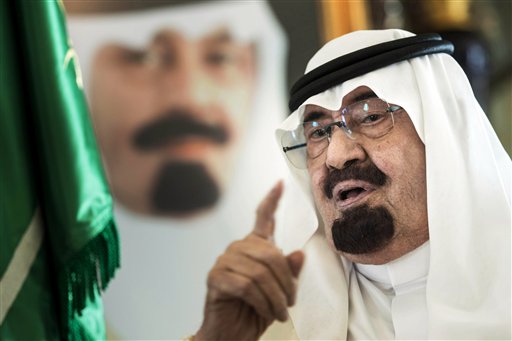
In this Friday, June 27, 2014 file photo, Saudi King Abdullah speaks before a meeting with U.S. Secretary of State John Kerry at his private residence in the Red Sea city of in Jiddah, Saudi Arabia. The official Saudi Press Agency says King Abdullah has been admitted to a hospital for medical tests. AP
RIYADH, Saudi Arabia — Saudi Arabia’s ailing King Abdullah, 91, was admitted to hospital on Wednesday for “medical checks,” the royal court said.
The king, whose age and frequent hospitalization have raised concerns about the future leadership of the key oil producer, was admitted to the King Abdulaziz Medical City in Riyadh, a court statement carried by the official SPA news agency said.
Abdullah’s half-brother Salman, 77, is next in line to the throne. He was named crown prince in June 2012 following the death of Prince Nayef bin Abdul Aziz.
Salman has been representing the king at most public events, including the latest Gulf summit in Qatar this month, due to the monarch’s ailing health.
The king’s latest hospitalization comes as Saudi Arabia holds a high-profile position in the US-led fight against the Islamic State group, which has seized swathes of neighboring Iraq and Syria.
Saudi warplanes have joined in coalition air strikes against the jihadists in Syria, although the ultra-conservative Muslim kingdom has faced calls to do more to halt the flow of funds and fighters to IS from among its own citizens.
The king’s absence from the public gaze for some time last year prompted rumours on social media networks that his health was deteriorating.
He underwent two operations in October 2011 and November 2012 to correct “ligament slackening” in the upper back.
Since the death in 1952 of King Abdul Aziz al-Saud, the founder of modern Saudi Arabia, the throne has systematically passed from one of his sons to another, brothers and half-brothers.
But many of Abdul Aziz’s sons have died or are aged. Abdullah’s former crown princes Sultan and Nayef died in 2011 and 2012 respectively.
In March 2014, King Abdullah named his half-brother Prince Moqren as a second crown prince, in an unprecedented move that clearly aimed at smoothing succession hurdles.
Moqren is the youngest of Abdul Aziz’s sons.